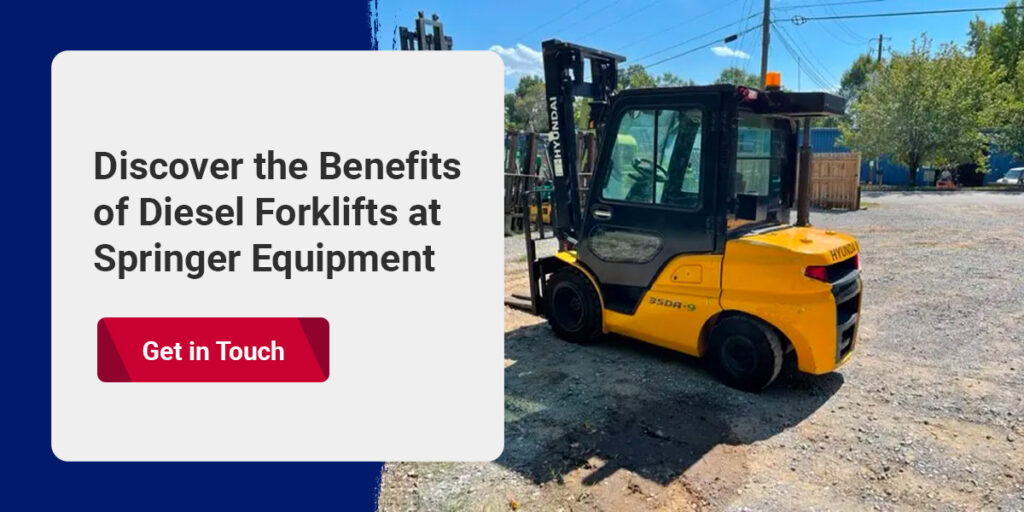Forklifts are essential pieces of equipment to help lift and move heavy loads. Before purchasing a forklift, it is important to understand the differences in gas and model types to know what is right for your specific needs.
Fuel type is one of the most significant specifications to consider when selecting a forklift. Diesel models offer a range of benefits that may make these models the best options for your applications. With this guide, you can understand the benefits and challenges of this equipment to make an informed purchase decision.
Advantages of Diesel Forklifts
Explore the benefits of diesel to determine whether this type of forklift is right for your job site.
High Power & More Loading Capacity
Diesel-powered equipment is known for its high-performance capabilities. Diesel forklifts have more drive line torque than propane or electric models at a given RPM. When you have heavy-duty jobs, diesel models are likely the best option.
Suited for Outdoor Use
The diesel model’s higher drive line torque allows diesel engines to work harder and contributes to better performance when working on outdoor job sites. While propane models can also operate outdoors, diesel forklifts are a highly popular choice because they can easily handle rugged terrain. These models can also work in wet or damp conditions.
Easy Refueling & Less Downtime
Compared to electric models, diesel forklifts are quick and easy to refuel. If you run out of fuel on the job site, you can refill the tank and return to your task. There is no wait time to recharge a battery. Easy refueling reduces your downtime and makes it easier to navigate if you have a multiple shift operation.
Better Visibility
Diesel forklifts do not have a tank on the back like propane models, allowing your operators to have greater visibility. Rear visibility is essential when navigating crowded work sites. If your team frequently operates on busy grounds, this extra safety feature can be a significant benefit.
Longevity with Less Maintenance
Diesel engines tend to last longer than propane counterparts and typically require less scheduled maintenance. If you’re searching for a long-lasting investment, diesel forklifts can deliver the return you’re looking for.
Disadvantages of Diesel Forklifts
While diesel forklifts offer a range of benefits, considering their disadvantages ensures you make an informed decision. If you choose to purchase a diesel forklift, you’ll need to prepare for these potential challenges.
Noise and Fumes
While diesel forklifts offer exceptional power, this performance comes at a cost. These models create dense fumes and loud noise. The noise can be harmful to workers’ ears, and the fumes are not safe to breathe in the long term. While these factors make diesel models unsuitable for indoor work, they are generally less of an issue when operating forklifts outside.
Bulky Design
Diesel forklifts tend to be on the bulkier side, which reduces maneuverability. Electric or propane forklifts may be better suited to your applications if you need to navigate tight spaces.
On-Site Fuel Storage
Bulk tank storage may be required to store your diesel fuel, which often comes at a high price and involves municipal regulations. You’ll also need to factor in possible liabilities with keeping diesel fuel on your property.
Signs a Diesel Forklift Is Right for You
It is very important when purchasing a forklift to consider your applications and working conditions to determine whether this fuel type is the best option for you.
Generally, diesel models are a strong choice for teams that:
- Work outdoors
- Handle high load capacities
- Have space to store a fuel tank
- Face busy worksites and need quick refueling
Discover the Benefits of Diesel Forklifts at Springer Equipment
Springer Equipment carries a broad range of used forklifts for any budget. With the many benefits of diesel forklifts, this fuel type can be an excellent choice for your next purchase. Enjoy those advantages at a reduced cost. Get in touch with us today if you have questions for our team.


